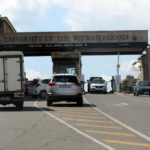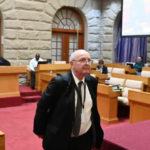Human rights activist Mary de Haas has accused Parliament of turning a blind eye to her repeated warnings that former police minister Bheki Cele interfered in the operations of the Political Killings Task Team (PKTT) — the specialised police unit established to investigate politically motivated murders in KwaZulu-Natal (KZN).
De Haas, an honorary research fellow in the University of KwaZulu-Natal’s School of Law, said she first alerted MPs in 2021 that Cele had taken direct operational control of the task team through Lt-General Dumisani Khumalo, one of his subordinates. In correspondence seen by Sunday World, she warned that Cele’s involvement amounted to political interference in criminal investigations.
In her 2021 letter to Parliament’s Portfolio Committee on Police, De Haas accused Cele of “grossly irregular and possibly criminal conduct” in the way he managed the task team. She cautioned that his “hands-on” role in politically charged investigations risked shielding his own ANC colleagues from scrutiny.
“Minister Cele continues to control the ministerial task team into political killings in KZN through his proxy, Gen Khumalo,” she wrote.
“He reports directly to the minister and not to the national commissioner. As you will know, Minister Cele is a very senior member of the ANC in KZN, so he is, in effect, controlling investigations into killings in which his own colleagues may be suspects.”
De Haas argued that Cele’s conduct blurred the lines between political authority and policing, calling Parliament’s inaction a dereliction of duty.
“Parliament has been very remiss in allowing a minister of police, especially a prominent, senior politician in a province known for its political violence, to head a team investigating these killings,” she wrote.
At the time, Cele chaired the interministerial committee appointed by President Cyril Ramaphosa to guide law enforcement on tackling political killings. Under this structure, the PKTT was established in 2018 to coordinate investigations into the growing wave of assassinations targeting politicians and public officials in KZN.
However, the task team’s existence has since become deeply controversial, sparking judicial and parliamentary scrutiny amid allegations of interference, poor oversight, and politically motivated prosecutions.
De Haas’s claims resurface in Mkhwanazi probe
De Haas’s earlier warnings resurfaced this month before Parliament’s ad hoc committee probing explosive allegations made by Lt-General Nhlanhla Mkhwanazi, the current KZN police commissioner.
Suspended Police Minister Senzo Mchunu told MPs that De Haas’s research and submissions had informed his decision to disband the PKTT, while Cele himself admitted that she had been calling for its disbandment “for years.”
“There is only one source that I know has a problem with the PKTT — it’s Aunt Mary,” Cele told MPs during a recent sitting. “That is the only source I know.”
Cele appeared to suggest that De Haas had been the driving force behind Mchunu’s decision to dismantle the unit — an assertion that has distressed the veteran activist, who says her legitimate oversight efforts have been ignored and misrepresented.
During his October appearance before the committee, Cele said he was “shocked” to discover a January letter from De Haas to national police commissioner Lt-General Fannie Masemola, asking whether the disbandment had been finalised.
“When I saw this letter, I said, ‘This can’t be.’ There are three elements there, including border issues and Crime Intelligence. The real one that has taken centre stage is the PKTT,” Cele said. “On 22 January, Mary de Haas writes a letter to the commissioner asking if the disbandment is done. I have seen Mary driving the process of the disestablishment of this task team. I don’t know what her interests are.”
Ignored warnings and safety fears
De Haas says the saga demonstrates that history is repeating itself. Last month, she wrote two letters — on October 15 and October 30 — to the ad hoc committee probing Mkhwanazi’s claims, copying the Speaker of Parliament, but both letters went unanswered.
Her latest correspondence, also viewed by Sunday World, details her frustration and fear for her safety. She objected to reports that Parliament might display her photograph during public hearings so that witnesses could “identify” her, calling the plan reckless and dangerous.
Speaking to Sunday World this week, De Haas said Parliament’s silence underscores a consistent failure of oversight in dealing with political interference in policing.
“I put the illegal tactics used by that team on record with Parliament a few years ago, plus Cele’s operational involvement, but the police committee failed in its oversight,” she said. “Everything I wrote to Minister Cele was copied to them, and I never got even an acknowledgement.”
A history of oversight failures
De Haas has long been a vocal critic of the politicisation of policing in KwaZulu-Natal, a province long plagued by politically motivated killings. Her reports have repeatedly highlighted links between party structures, law enforcement, and criminal syndicates, warning that blurred boundaries threaten accountability.
While her claims have often provoked political backlash, the activist maintains that her interventions are grounded in evidence and aimed at strength`1ening democratic oversight.
With the parliamentary committee now revisiting the PKTT controversy amid Mkhwanazi’s explosive testimony, De Haas’s old warnings have resurfaced — this time as potential evidence in a widening probe into the intersection of politics, policing, and corruption in South Africa’s most volatile province.

Follow Us on Twitter











